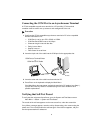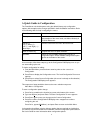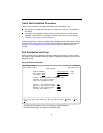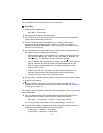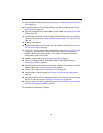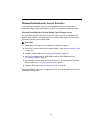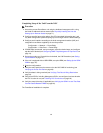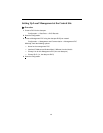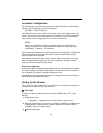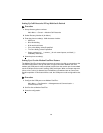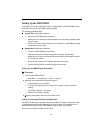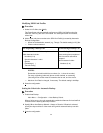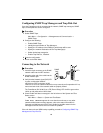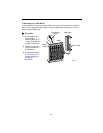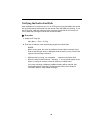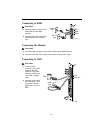
14
Automatic Configuration
The FrameSaver unit provides several automatic configuration features. Frame Relay
Discovery and configuration is one of these features.
Main Menu
→
Auto-Configuration
The default discovery mode is 1MPort. In this mode, for each DLCI discovered on the
network, the unit creates a network interface DLCI containing two EDLCIs (embedded
DLCIs – one for Port-1 data and the other for management), a Port-1 DLCI with the
same number, and a management PVC, then cross-connects them.
NOTE:
When auto-configuration creates a multiplexed DLCI, but a standard DLCI is
needed, change the DLCI to Standard from the network DLCI Records screen:
Configuration
→
Network
→
DLCI Records
Other modes can be selected. See
Setting Up Automatic Configuration
in
Configuration
of the User’s Guide for information about other modes and how the Frame Relay
Discovery Mode can be changed.
No automatic configuration occurs until the network cable is connected. If you do not
want management links configured or automatic configuration, change the default
setting for the Frame Relay Discovery feature.
Time Slot Assignment
Network time slots are discovered automatically when Time Slot Discovery is enabled
(the default setting) on the Frame Relay Network 1 Assignments screen. This feature
can be disabled if you want to manually configure time slots.
See
Assigning Time Slots/Cross Connections
in
Configuration
of the User’s Guide for
additional information about this feature.
Setting Up the Modem
The unit has an integral modem for remote management. It is already set up for dial-in
access to the unit, with Port Use set to Terminal.
Procedure
If using the modem for dialed IP network connectivity (SNMP, Telnet, FTP, or trap
dial-out):
1. Select Modem Port.
Configuration
→
Management and Communication
→
Modem Port
2. Minimally, change Port Use to Net Link, and assign the interface’s IP Address and
Subnet Mask if it is different from the Node’s. Change Link Protocol to SLIP, if
necessary (PPP is the default setting).
3. S
ave the configuration.



